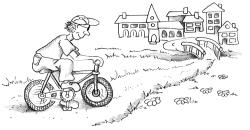Imperfekt – Past Tense in German Grammar

The past tense, also called simple past or imperfect (Imperfekt or Präteritum in German), is used to express facts and actions that started and ended in the past. It is typically used to tell stories or report past events in written German. In spoken language, it is common to use the perfect tense instead of the past tense. We can use the English simple past to translate this tense.
Example

Im letzten Jahr machte ich Urlaub in Deutschland.
Mit dem Fahrrad fuhr ich auf dem Elbe-Radweg von Hamburg bis Dresden. Die Strecke war fantastisch und ich hatte tolles Wetter.
usage of the past tense in German
There are two ways to use the past tense in German, we can use it to express:
- a completed action in the past
- Example: Im letzten Jahr machte ich Urlaub in Deutschland.
-
Mit dem Fahrrad fuhr ich von Hamburg bis Dresden.
- a fact or condition in the past
- Example: Die Strecke war fantastisch und ich hatte tolles Wetter.
The past tense in spoken German
In everyday spoken German, it’s more common to use the present perfect to talk about the past.
- Example:
- Im letzten Jahr habe ich Urlaub in Deutschland gemacht. Mit dem Fahrrad bin ich auf dem Elbe-Radweg von Hamburg bis Dresden gefahren.
However, we still use the simple past of the verbs sein/haben to describe facts and conditions in the past.
- Example:
- Die Strecke war fantastisch und ich hatte tolles Wetter.
How to conjugate the past tense in German
To conjugate verbs in the simple past, we remove the infinitive ending -en and add the following endings:
| person | weak verbs | strong/mixed verbs | ||
|---|---|---|---|---|
| 1st person singular (ich) | -te | ich lernte | – | ich sah |
| 2nd person singular (du) | -test | du lerntest | -st | du sahst |
| 3rd person singular (er/sie/es/man) | -te | er lernte | – | er sah |
| 1st person plural (wir) | -ten | wir lernten | -en | wir sahen |
| 2nd person plural (ihr) | -tet | ihr lerntet | -t | ihr saht |
| 3rd person plural/polite form (sie/Sie) | -ten | sie lernten | -en | sie sahen |
The verbs sein/haben are irregular. They are especially important in the simple past:
| person | sein | haben |
|---|---|---|
| 1st person singular (ich) | ich war | ich hatte |
| 2nd person singular (du) | du warst | du hattest |
| 3rd person singular (er/sie/es/man) | er war | er hatte |
| 1st person plural (wir) | wir waren | wir hatten |
| 2nd person plural (ihr) | ihr wart | ihr hattet |
| 3rd person plural/polite form (sie/Sie) | sie waren | sie hatten |
Exceptions
- Many strong/mixed (irregular) verbs change the word stem in the simple past. (see list of strong and mixed verbs)
- Example:
- gehen – ging, bringen – brachte
- If the word stem of a strong verb ends in s/ß/z, we either leave off the ending s, or we add an extra e.
- Example:
- lesen – las – du last/du lasest
- If the word stem ends in d/t, we add an e before the ending for endings that begin with t/st.
- Example:
- landen – ich landete, du landetest, er landete, wir landeten, …
- bitten – ich bat, du batest, …, ihr batet
- If the word stem of a strong verb ends in ie, there is no ending e in the 1st/3rd person plural.
- Example:
- schreien – wir/sie schrien (not:
schrieen) - At last now you can use the past simple in German simply. Also try to get the best German Keyboard translator.





























